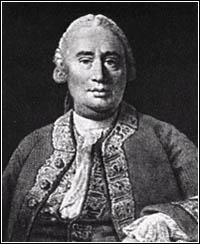|
| ||
|
One of the most important thinkers of the Western world, philosopher and Edinburgh native David Hume lead a turbulent professional life that was dogged with controversy. Born in 1711 just outside Edinburgh in Berwickshire, Scotland, Hume was the  son of an upper-middle class family. He was educated by his widowed mother and, having been raised a Calvinist, was devoutly religious for most of his childhood. Later on however, he would begin to doubt, question, and criticize the doctrines in which he had once had so much faith.
son of an upper-middle class family. He was educated by his widowed mother and, having been raised a Calvinist, was devoutly religious for most of his childhood. Later on however, he would begin to doubt, question, and criticize the doctrines in which he had once had so much faith.
Enrolling in the University of Edinburgh at the age of eleven, Hume was encouraged to go into law, but discovered that he was much more interested in philosophy. He remained at the University for about four years, after which he left to pursue private education. It was during this time that he began to become skeptical of religion and to actively disbelieve the a lot of what he'd been taught as a child. This would later become one of the underlying themes of his philosophical theories. Hume would go on to write that common sense and reason were paramount and that we could have no knowledge that extended beyond our own personal experience. He also wrote that nothing could known by the mind but its own "impressions" (sensations) and "ideas" (faint copies of impressions), ideas that were probably influenced by the writings of Plato. One of the principal aspects of his writings was his contention that there was no external source of morality, no higher power. This of course drew much criticism from religious organizations. Because of his controversial views, he was denied appointment to the Philosophy Chairs of both Edinburgh and Glasgow university. A very prolific writer, many of Hume's works are generally considered masterpieces and are still read today. Several works in particular stand out among the volumes he published, including Treatise of Human Nature, Enquiry Concerning Human Understanding, and his two most important works on religion, The Natural History of Religion and The Dialogues Concerning Natural Religion. Even though he did, with several of his works, make changes so they would be "less offensive" to the Christian authorities, they still vehemently attacked his writings, calling him "irreligious" and "dangerous to religion." In 1748, he published the essay "Of National Characters," which was basically his rebuttal to the clergy. In it he accused the clergy of being a profession composed of petty, conceited, and vindictive people. This, of course, didn't do much for the church's opinion of him. Hume also published a lengthy non-philosophical work, a six-volume History of England that began with the Roman invasions and ended with his present day. Winston Churchill is said to have read this book in his youth as a "boyhood manual", and it's quite likely that it influenced his own History of English-Speaking People. In addition to his legions of critics, Hume did have several followers and close friends. Among them were German philosopher Emmanuel Kant (who credits Hume with being the father of Utilitarianism), French Philosopher Jean Jacques Rousseau (whom Hume gave asylum when he was forced out of Switzerland), and Scottish Economist Adam Smith. David Hume lived until 1776, when he died of natural causes at the age of 65. Even after his death, he was the center of controversy, this time stemming from the release of several previously unpublished works of his that were discovered after his death. Among these works were his dialogues, two previously suppressed essays (one on suicide, the other on immortality), and his now-famous autobiography, My Own Life. SBB, November 1999
| ||
|
| ||
Thursday, December 26th, 2019
Attention visitors: Tartans.com is back. Please note that this is a snapshot of the site as it existed nearly 20 years ago and you may encounter broken links; we are still combing through the site and correcting those as we find them. Please also note that some sections are currently not functional, primarily the discussion forums/clan chat boards.
|
** HOME - First Time Visitors - Glossary - - Contact Us ** Awards | Bibliography | Clan Calendar | Clan Chat | Clan Finder | History | Famous Scots | Genealogy | Great Hall of the Clans | Links | News and Features | Scots on the Net | Search | Site Map The Gathering of the Clans
Copyright 1995- Tartans.com - All Rights Reserved. |
